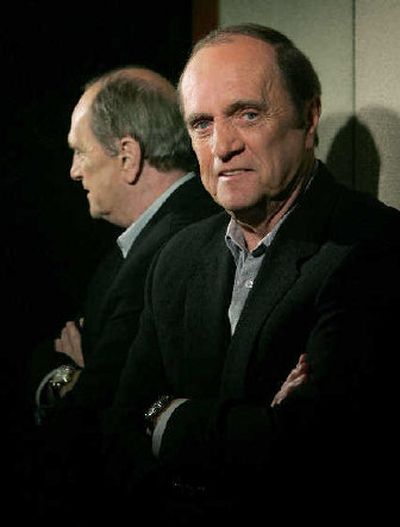Modest master

Bob Newhart responds with customary modesty when asked about his selection as a subject for the PBS series “American Masters.”
“I don’t think of myself as an American Master,” he says. “I’ve just been making a living. I just thought that (my career) would end in five years.”
But his popularity didn’t end after his smash 1960 comedy album, “The Button-Down Mind of Bob Newhart.” That collection of his monologues – such as “Abe Lincoln vs. Madison Avenue” and “The Nude Police Line-Up” – made him a hot ticket on TV variety shows, in nightclubs and theaters.
Then came two hit TV series. Not bad for a guy who used to be an accountant.
Tonight, PBS’ “American Masters” series traces his life and career in “Bob Newhart: Unbuttoned,” with clips from his TV series and concert appearances plus comments by his fellow comedians and Newhart himself.
Bob and Virginia Newhart live alone in a chateau deep in plush Bel-Air, Calif. Their two sons and two daughters have married and flown the nest, and they have six grandchildren.
The surroundings may be pretentious, but the lord of the manor is not. He strides into the interview wearing a white golf shirt, neat jeans and spotless tennis shoes. He’s 75, but you’d scarcely know it.
The Newhart saga began in his native Chicago, where he had moved from accounting to writing ad copy. A fan of the Bob and Ray comedy team on radio, he collaborated with a friend, Ed Gallagher, on comedy scenes they recorded and sent to radio stations. No sale.
Gallagher moved to New York, and Newhart continued solo. Warner Bros. Records bought his “Button-Down Mind” album, and it zoomed to No.1 on the charts and won three Grammys, including album of the year.
“There really was a sea change in comedy around the late 1950s and early ‘60s,” Newhart recalls. “Shelley Berman, Mike (Nichols) and Elaine (May), Jonathan Winters, Lenny Bruce – it was a departure from what had gone before. …
“We didn’t all get together and say, ‘We’ve got to change the face of comedy.’ It was just our way of doing it. We also have to give credit to our audience. You could speak to them on a level, and they would know what you’re talking about.”
Newhart moved to Hollywood in 1961 and starred in a TV variety show.
“We got an Emmy, a Peabody and a pink slip from NBC, all in one season,” he says with a rueful smile.
He waited until 1972 before embarking on CBS’ “The Bob Newhart Show,” which became a classic sitcom in its six-season run. Another CBS sitcom, “Newhart,” began in ‘82 and lasted eight years. A third series, 1992’s “Bob,” failed in one season.
Newhart remembers when he soured on TV series: “I was alone on the set and having lunch; everyone else had gone out to lunch. I said to myself, ‘Are you trying to die on a soundstage? Is that your grand plan, that you would drop dead on a soundstage?’ “
Even though he left the series grind behind, he’s far from retired. He still manages about 35 appearances per year with his monologues and has played roles in the movies “In & Out,” “Legally Blonde 2: Red, White & Blonde” and “Elf.”
On television, he was impressive in a dramatic role as a suicidal widower on “ER” and on TNT’s movie “The Librarian: Quest for the Spear.”
But his most notable recent TV appearances came on two episodes of last season’s hit “Desperate Housewives,” playing the estranged boyfriend of Leslie Ann Warren. He chuckles about the character Morty.
“It’s really something I haven’t played before,” he says. “It’s not Bob Hartley (of ‘The Bob Newhart Show’). It’s not Dick Loudon (of ‘Newhart’).
“It’s a recurring role, but I don’t know how many I’ll do next year, maybe two or six. If they want me, I’ll be there.”
Newhart certainly has other activities to keep him occupied. He has released a DVD of the first season of “The Bob Newhart Show” and soon will have another of the second season. Four more will follow.
He’s preparing a DVD called “Standup,” which will include the cream of his soliloquies.
And he’s finally writing his autobiography.
“I had hemmed and hawed for years,” he says, “and I finally decided this year I gotta do it. I signed a piece of paper (with Hyperion). That’s what I had to do. I know me. I’d still be on Page One if I hadn’t signed that piece of paper.”
The interview over, Bob escorts the visitor to the expansive courtyard out front. He reminisces about when he was a soldier during the Korean War stationed at a Central California camp. He and two buddies drove to L.A. on weekend passes.
“We would drive west on Sunset Boulevard and look at all the big houses and wonder who was living there,” he reflects. “Now I’m in one of them.”